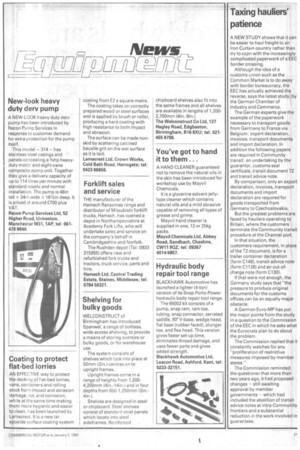Taxing hauliers' patience
Page 21

If you've noticed an error in this article please click here to report it so we can fix it.
A NEW STUDY shows that it can be easier to haul freight to an Iron Curtain country rather than try to cope with the increasingly complicated paperwork of a EEC border crossing.
Although the idea of a customs union such as the Common Market is to do away with border bureaucracy, the EEC has actually achieved the reverse, says the latest study, by the German Chamber of Industry and Commerce.
The German experts give the example of the paperwork necessary to transport goods from Germany to France via Belgium: export declaration, invoices, transport documents and import declaration. In addition the following papers are required in Community transit: an undertaking by the guarantor, customs.seal certificate, transit document T2 and transit advice note.
By comparison, only an export declaration, invoices, transport documents and import declaration are required for goods transported from Germany to Czechoslovakia.
But the greatest problems are faced by hauliers operating to Britain, where the customers terminate the Community transit procedure at the Channel port.
In that situation, the customers requirement, in place of the T2 document, is for a trailer container declaration (form C148), transit advice note (form C1128) and an out-ofcharge note (form C130).
If that were not enough, the Germany study says that "the pressureto produce original documents for the customs offices can be an equally major obstacle.
A German Euro-MP has put the major points from the study in a question to the Commission of the EEC in which he asks what the Eurocrats plan to do about the problem.
The Commission replied that it constantly watches for any "proliferation Of restrictive measures imposed by member states."
The Commission reminded the questioner that more than two years ago, it had proposed changes — still awaiting approval by member governments which had included the abolition of transit advice notes at intra-Community frontiers and a substantial reduction in the work involved in guarantees.














































